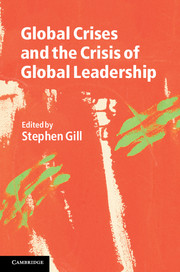Book contents
- Frontmatter
- Contents
- Contributors
- Acronyms
- Acknowledgements
- Introduction: global crises and the crisis of global leadership
- Part I Concepts of Global Leadership and Dominant Strategies
- Part II Changing Material Conditions of Existence and Global Leadership: Energy, Climate Change and Water
- Part III Global Leadership Ethics, Crises and Subaltern Forces
- Part IV Prospects for Alternative Forms of Global Leadership
- 10 Global democratization without hierarchy or leadership? The World Social Forum in the capitalist world
- 11 After neoliberalism: left versus right projects of leadership in the global crisis
- 12 Crises, social forces and the future of global governance: implications for progressive strategy
- 13 Organic crisis, global leadership and progressive alternatives
- Glossary
- Bibliography
- Index
13 - Organic crisis, global leadership and progressive alternatives
from Part IV - Prospects for Alternative Forms of Global Leadership
Published online by Cambridge University Press: 05 June 2012
- Frontmatter
- Contents
- Contributors
- Acronyms
- Acknowledgements
- Introduction: global crises and the crisis of global leadership
- Part I Concepts of Global Leadership and Dominant Strategies
- Part II Changing Material Conditions of Existence and Global Leadership: Energy, Climate Change and Water
- Part III Global Leadership Ethics, Crises and Subaltern Forces
- Part IV Prospects for Alternative Forms of Global Leadership
- 10 Global democratization without hierarchy or leadership? The World Social Forum in the capitalist world
- 11 After neoliberalism: left versus right projects of leadership in the global crisis
- 12 Crises, social forces and the future of global governance: implications for progressive strategy
- 13 Organic crisis, global leadership and progressive alternatives
- Glossary
- Bibliography
- Index
Summary
Summary
Many global struggles over the future of global leadership and global governance are connected to the question of rights, redistribution and recognition of the dignity and equality of peoples. Indeed, such struggles are grounded in responses to changing conditions of existence constituted, in part, by the crises, contradictions and consequences of the acceleration of both intensive and extensive aspects of global capitalism. This chapter identifies three such processes and contradictions. It argues that political responses to such contradictions on the part of dominant and subaltern forces will shape global development and the making of the emerging world order.
A renewal of what Marx called the original or ‘primitive’ accumulation of capital, which involves the dispossession of communities and producers of their basic means of subsistence and livelihood.
Increases in the turnover time of capital associated with the greater global scope and intensity of the exploitation of human beings and nature.
A profound restructuring of the institutions of and conditions for social reproduction.
These contradictions are related to relatively unprecedented global problems, such as rapid population growth, degradation of the biosphere, climate change, highly developed powers of production and destruction, surveillance and control, and the militarization of space. These constitute some of the ‘morbid symptoms’ of an increasingly contradictory world order characterized by extreme global inequality and social polarization. Put differently, global struggles are connected to intersecting economic, social, ecological and political crises, which I have referred to as a ‘global organic crisis’ – a historical situation in which much of the ‘old’ order seems to have largely exhausted its potentials and in which ‘new’ forces are still struggling to emerge in a politically coherent manner. In this context, the task of the progressive lefts (in the plural) is to combine politically and seek to construct new constitutions, new governance mechanisms and new policies for attaining social justice, equality, human security, human rights and human development; in short, a new type of world order.
- Type
- Chapter
- Information
- Global Crises and the Crisis of Global Leadership , pp. 233 - 254Publisher: Cambridge University PressPrint publication year: 2011
- 4
- Cited by



